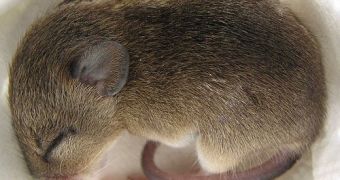A new study carried out in mice, concluded that being born in winter versus summer, can affect the biological clock in the long-term.
The team of researchers noticed that mice born and weaned in a 'winter' light cycle (8 hours of light and 16 hours of dark) had serious disorders in their biological clocks later in life, compared to baby mice born in a 'summer' light cycle (16 hours of light and 8 hours of dark).
Douglas McMahon, a biologist at Vanderbilt University in Tennessee, and his team, raised baby mice from birth to weaning (nearly 3 weeks) in either summer or winter light cycles.
They also had a third group of baby mice experiencing equal day and night periods (12 hours each), LiveScience reports.
Once the mice were weaned, they were distributed into new light cycles: half the mice remained in a winter cycle and half passed to a summer program, and viceversa for the summer mice.
As for the mice that grew up in 12 hours periods of light and dark, they were divided into 3 categories: winter cycle, summer cycle, and the 12-hour cycle.
Twenty-eight days later, all the mice were left into continuous darkness, so that the researchers could observe the natural biological cycle of each mouse.
“We were curious to see if light signals could shape the development of the biological clock,” said McMahon.
The results showed that light has a big influence on biological cycles: the mice born in summer either stayed on the summer cycle or switched to winter (were awake for 10 hours and rested for 14 hours), while the winter-born mice that remained in winter kept their 10-hours-on, 14-hours-off program, unlike those that switched to summer, who stayed active for an 90 minutes.
This is the first discovery of its kind in mammals, and it could also explain why some people born in winter face a higher risk for developing mental disorders like bipolar depression, schizophrenia and seasonal affective disorder.
McMahon said in a statement that “we know that the biological clock regulates mood in humans.
“If an imprinting mechanism similar to the one that we found in mice operates in humans, then it could not only have an effect on a number of behavioral disorders, but also have a more general effect on personality.”
No one knows yet whether humans respond the same way to early-life light exposure, but according to McMahon, the winter-born mice's exaggerated response to seasons changing was "strikingly similar" to human seasonal affective disorder.
Still, we should not ignore that there are also several other factors that could play for people born in winter, like exposure to flu or other seasonal diseases.
This research was published online in the journal Nature Neuroscience.

 14 DAY TRIAL //
14 DAY TRIAL //